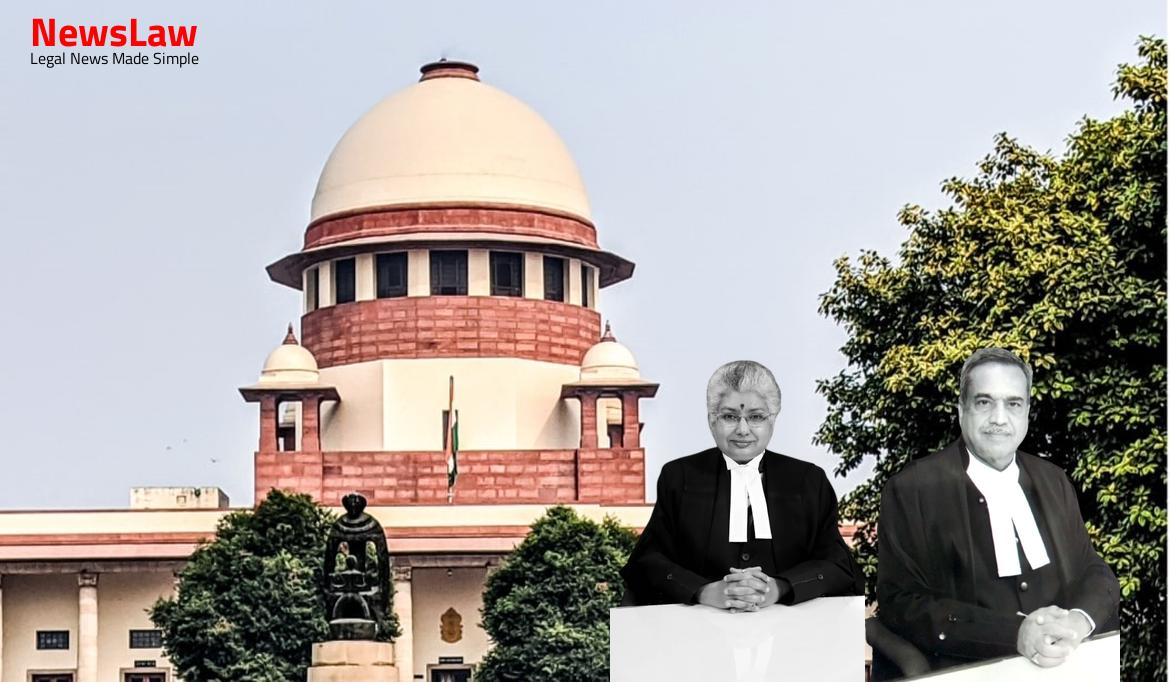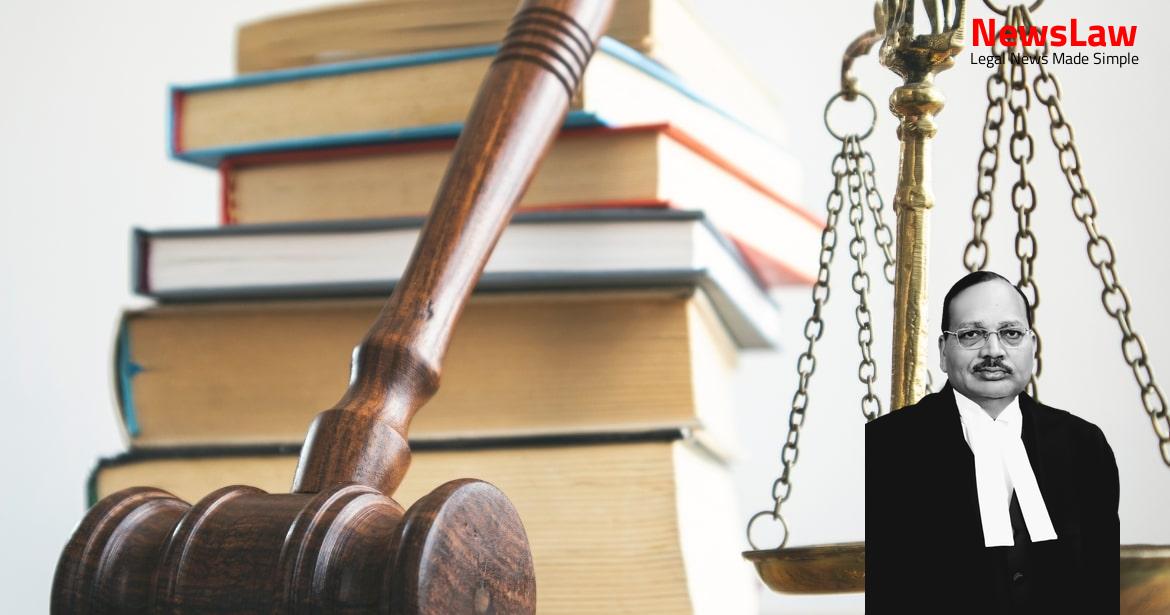In a recent legal battle, the Supreme Court of India upheld its decision in a Cheque Dishonor Case involving Original Name and Mr. Mallikarjun. The case delved into the nuances of the NI Act and the implications of dishonored cheques. Find out more about this significant judgment and its impact on financial transactions in India.
Facts
- The Appellant lent INR 2,00,000 to the Respondent for family necessities and accommodation.
- The Respondent issued a cheque as a guarantee but it was dishonoured due to insufficient funds.
- The Respondent claimed the cheque was given to someone else for security purposes in 2012.
- A Demand Notice was sent to the Respondent for failing to repay the loan.
- The Trial Court observed that the Respondent failed to explain how the cheque ended up with the Appellant and for what purpose it was issued to Mr. Mallikarjun.
- The Agreement presented by the Appellant did not have the Respondent’s signature against the terms but had the Respondent’s signature on the stamp paper, which was deemed unsustainable by the Court.
- Scrutiny of the Appellant’s Income Tax Returns revealed that the alleged loan transaction was not declared to the Income Tax Department.
- The Trial Court ruled in favor of the Respondent, dismissing the Appellant’s complaint and acquitting the Respondent.
- The Appellant’s financial capacity to grant a loan was questioned by the Respondent, and since the Respondent couldn’t prove it, it was presumed that the loan transaction did not occur.
- The High Court of Karnataka noted the contradiction in the Appellant’s statement regarding when the cheque was issued to him by the Respondent.
Arguments
- The reliance on the decision in Rangappa (supra) by the High Court was deemed misplaced.
- Even when applying the standard of preponderance of probabilities, Original Name failed to discharge the onus.
- Accused can rely on materials adduced by the complainant in rebuttal of the statutory presumption.
- This includes the complainant’s version in the original complaint, legal or demand notice, case at the trial, and the plea of the accused in reply notice.
- Accused can also refer to their statement under Section 313 of CrPC 1973 and circumstances under which the promissory note or cheque was executed.
- Deliberation on the applicable provisions of the NI Act 1881 and other relevant laws is necessary.
Analysis
- The liability of the defence in cases under Section 138 of the NI Act 1881 does not require proving the case beyond reasonable doubt.
- Rebuttal can be established through conclusive evidence or preponderance of probabilities.
- A presumption only survives if contrary evidence is not proved, specifically regarding the issuance of a cheque for consideration or debt discharge.
- Concurrent findings of acquittal can be deemed perverse only if they ignore relevant material or suffer from irrationality or weight of evidence.
- Interference in concurrent findings is required when based on irrelevant grounds, fallacies, manifest errors, or violation of principles of natural justice.
- Presumptions under the NI Act 1881 are rebuttable, and essential conditions must be fulfilled before invoking the law.
- An accused can trigger a presumption under Section 139 of the NI Act 1881 even without admitting to execution of the entire contents of the cheque.
- Checks issued towards liabilities, dishonored, notice sent, and non-payment within 15 days are essential for Section 138 offense.
- Deemed fictions and reverse onus clauses in the NI Act 1881 shift burden of proof to the accused.
- The accused cannot take the defence that they had no reason to believe the cheque would be dishonored, as per Section 140 of the NI Act 1881.
- The Appellant established the signature on the cheque was of the Respondent.
- In cases of financial capacity concern, the burden of proof is on the complainant to provide cogent evidence.
- Statutory limitation of 30 days exists to file a complaint under Section 138 of the NI Act 1881.
- Burden of proving a cheque was not issued for debt is on the accused.
- Cheque dishonor is an offense under Section 138 of the NI Act 1881.
- Liberal approach towards attendance of accused unless absolutely necessary.
- Presumptions under Section 118 and 139 of the NI Act 1881 play crucial roles.
- Failure to honor a cheque is considered an offense.
- Section 140 emphasizes mens rea is immaterial in Section 138 proceedings.
- Court should adopt a liberal approach with regard to presence of the accused.
- Concurrent findings of acquittal should not be interfered with unless perversity is evident.
- A contradiction in the complaint related to the timing of the cheque presentation was noted.
- Challenges against acquittal require careful consideration due to the reinforced presumption from well-reasoned outcomes.
- Cause of action in cheque dishonor cases arises after the failure of the drawer to pay post receiving notice.
- Section 138 of the NI Act 1881 pertains to the dishonour of a cheque due to insufficient funds in the account.
- If a cheque is returned unpaid by the bank because of insufficient funds or exceeding the arranged amount, it is considered an offence.
- The punishment for such an offence can include imprisonment for up to two years, a fine of up to twice the amount of the cheque, or both.
- Certain conditions must be met for this section to apply, such as presenting the cheque within six months, receiving a written notice from the payee within thirty days of dishonour, and failing to make payment within fifteen days of receiving the notice.
- The amendment to the NI Act 1881 through Chapter VIII aims to enhance the credibility of cheque transactions and prevent harassment of honest drawers.
Decision
- The present challenge to the impugned judgment dated 03.03.2023 by the High Court of Karnataka at Kalaburagi lacks merit.
- This challenge does not warrant any interference from this court.
- The instant appeal has been dismissed.
- The findings of the High Court in the impugned judgment dated 03.03.2023 have been affirmed.
- Any pending applications have been disposed of.
Case Title: SRI DATTATRAYA Vs. SHARANAPPA (2024 INSC 586)
Case Number: Crl.A. No.-003257-003257 – 2024



